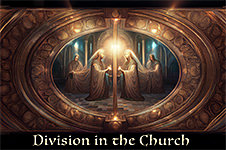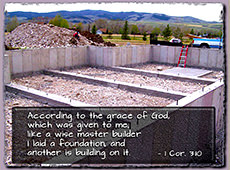First Corinthians 3:1–23 . . .
Church Divisions
Because the Corinthians, in their “fleshly” condition, blocked their capacity to understand spirituality, they began to act as “infants” in their divisiveness (vv. 1–4, shown at the bottom of this page). Apollos and Paul were servants who worked as fellow workers in God’s field (the church) and will receive rewards from God. But God is the one who brings about life and should be honored. In vv. 9–15, Paul, addressing divisions in the Corinthian church, describes the church as a building. He stresses the quality we should strive for in constructing each stage of the church — from laying the foundation through the actual construction to the final inspection. In this imagery he gives some of Christianity’s nuts and bolts in the form of these two construction tips.
1) Make sure to build on the right foundation (vv. 9–11). In v. 9 [NASB], Paul writes, “For we [Paul and Apollos] are God’s fellow workers; you [Corinthians] are God’s field, God’s building.” In this simple phrase, Paul informs us that the church is “God’s building.” However, we believers in Jesus cannot build the church until we share his perspective and attitude.
In vv. 10–11, Paul instructs us on how to build the church on the right foundation. You’ll see in those two verses that he’s careful to state that his ministry is performed “according to the grace of God.” He can’t take credit for who he is or what he’s accomplished because it’s all the result of God’s grace. Paul states that he served “like a wise master builder.” This is the only time in the New Testament that the term “master builder” (Greek: architekton) is used. The foundation that the architekton builds upon is Jesus Christ.
Now that Paul has urged us to make sure we build our church on the right foundation — upon Jesus Christ — we should carefully follow the next step that Paul covers in vv. 12–15.
2) Make sure to build God’s church properly, using high-quality materials. Hence, in vv. 12–13, Paul writes, “Now if any man builds on the foundation with gold, silver, precious stones, wood, hay, straw, each man’s work will become evident because it’s to be revealed with fire; and the fire itself will test the quality of each man’s work.”
In light of Paul’s example in v. 12, “gold, silver, costly stones” are quality materials, fit for construction of the foundation of Christ crucified; these materials are not only appropriate for this foundation but fit to endure fire. Conversely, “wood, hay, or straw” are inferior materials, unfit for constructing the foundation that Paul laid because they aren’t fireproof; rather, these materials are the perishable stuff of human wisdom (1:18) that inevitably perceives the gospel as being foolish. Paul urges his readers to use only the best materials — long-lasting ones, not temporal, earthly, flammable building materials.
Why is God so concerned that we build the church on the right foundation with the right materials? The reason Paul exhorts us so seriously about the materials we use in building God’s church is that there’s going to be an inspection. It seems that Paul is expressing his deep love for the church while suggesting that the “one who builds poorly on the church will jeopardize his or her future reward.”
Because of the church’s divine nature, in vv. 16–23 Paul warns his friends in Corinth to repent of their divisiveness and not threaten the unity of the church because: (1) God will judge the one who divides it; (2) every servant belongs to the church; and (3) the church belongs to God.
We believers become “living stones” (1 Peter 2:4–5) that are equipped to help build God’s church by actively engaging with our faith and agreeing to ask Jesus to become its “cornerstone.” Thereby, each of us should strive to integrate our lives with his teachings, actively participating in our community, using our gifts to serve others, and demonstrating love and unity with fellow believers, essentially becoming a vital part of the spiritual structure of the church, just as a stone is an essential structural element of a building.
Note: 1st Corinthians challenges believers to examine every aspect of their lives through the lens of the Gospel. In chapters 1–4, Paul presents these four challenges:
Christ is God’s wisdom (ch. 1) | Spiritual wisdom (ch. 2)
The church and its leaders (ch. 3) | True apostleship (ch. 4)
› Watch BibleProject’s superb animated video (1 min.) that highlights Paul’s messages in these first four chapters.
† Summary of 1 Corinthians 3:1–23
• Spiritual Immaturity (vv. 1–3)
Herein, Paul begins by addressing the Corinthians as “infants in Christ,” indicating their spiritual immaturity. He explains that he had to feed them “milk” rather than “solid food” because they weren’t yet ready for deeper spiritual truths. This metaphor emphasizes the need for spiritual growth and development in the Christian life.
• Division in the Church (vv. 4–5)
The apostle then tackles the issue of division within the Corinthian church by pointing out that their quarreling and alignment with different leaders (Paul, Apollos, and so on) are signs of worldliness and immaturity. Paul emphasizes that both he and Apollos are merely servants of God, each playing a different role in the growth of the church.
• God’s Role in Growth (vv. 6–9)
Paul uses an agricultural metaphor to illustrate the roles of different ministers and God’s supreme role in spiritual growth:
† Paul planted the seed (founded the church)
† Apollos watered it (nurtured the church)
† But God made it grow
This analogy underscores that while human leaders may play important roles, it’s God who ultimately brings about spiritual growth and transformation.
• The Church as God’s Temple (vv. 10–17)
Paul then shifts to a construction metaphor, describing the church as God’s building. He emphasizes:
† Christ as the church’s foundation
† The importance of building carefully on this foundation
† The testing of each person’s work by fire on the day of judgment
He further develops this imagery by declaring that the Corinthian church body members are God’s temple, indwelt by the Holy Spirit. This powerful metaphor highlights the sanctity of the church and the individual believer.
• Warning Against Worldly Wisdom (vv. 18–23)
The chapter concludes with a strong warning against relying on worldly wisdom. Paul quotes from the Old Testament to show that God frustrates the wisdom of the wise. He encourages the Corinthians to recognize that all things belong to them through Christ, and they belong to Christ, who belongs to God.
In essence, chapter 3 addresses spiritual growth, unity in the church, the roles of leaders and God in spiritual development, the nature of the church as God’s temple, and the superiority of God’s wisdom over the world’s. While these themes are crucial for understanding Paul’s message to the Corinthian church, they remain relevant for Christian communities today.
- Q. 1 From this passage, what are the characteristics of worldly versus spiritual people?
- Q. 2 From vv. 6–9, who plants? Who waters? Who is the field? Who is responsible for growth? How does this illustration relate to the problem in the Corinthian church?
- Q. 3 Which of the following physical stages of life best describes your spiritual stage of development: Newborn? Toddler? Kid? Teenager? Young adult? Middle-aged? Senior citizen?
1 Corinthians 3:1–23
New American Standard Bible (NASB)
[You can view it in a different version by clicking here; you can also listen to this chapter.]
The Church and Its Leaders
1And I, brethren, could not speak to you as to spiritual men, but as to men of flesh, as to infants in Christ. 2I gave you milk to drink, not solid food; for you were not yet able to receive it. Indeed, even now you are not yet able, 3for you are still fleshly. For since there is jealousy and strife among you, are you not fleshly, and are you not walking like mere men? 4For when one says, “I am of Paul,” and another, “I am of Apollos,” are you not mere men?
5What then is Apollos? And what is Paul? Servants through whom you believed, even as the Lord gave opportunity to each one. 6I planted, Apollos watered, but God was causing the growth. 7So then neither the one who plants nor the one who waters is anything, but God who causes the growth. 8Now he who plants and he who waters are one; but each will receive his own reward according to his own labor. 9For we are God’s fellow workers; you are God’s field, God’s building.
10According to the grace of God which was given to me, like a wise master builder I laid a foundation, and another is building on it. But each man must be careful how he builds on it. 11For no man can lay a foundation other than the one which is laid, which is Jesus Christ. 12Now if any man builds on the foundation with gold, silver, precious stones, wood, hay, straw, 13each man’s work will become evident; for the day will show it because it is to be revealed with fire, and the fire itself will test the quality of each man’s work. 14If any man’s work which he has built on it remains, he will receive a reward. 15If any man’s work is burned up, he will suffer loss; but he himself will be saved, yet so as through fire.
16Do you not know that you are a temple of God and that the Spirit of God dwells in you? 17If any man destroys the temple of God, God will destroy him, for the temple of God is holy, and that is what you are.
18Let no man deceive himself. If any man among you thinks that he is wise in this age, he must become foolish, so that he may become wise. 19For the wisdom of this world is foolishness before God. For it is written, “He is the one who catches the wise in their craftiness” (Job 5:13); 20and again, “The Lord knows the reasonings of the wise, that they are useless” (Psalm 94:11). 21So then let no one boast in men. For all things belong to you, 22whether Paul or Apollos or Cephas (that is, Peter) or the world or life or death or things present or things to come; all things belong to you, 23and you belong to Christ; and Christ belongs to God.



